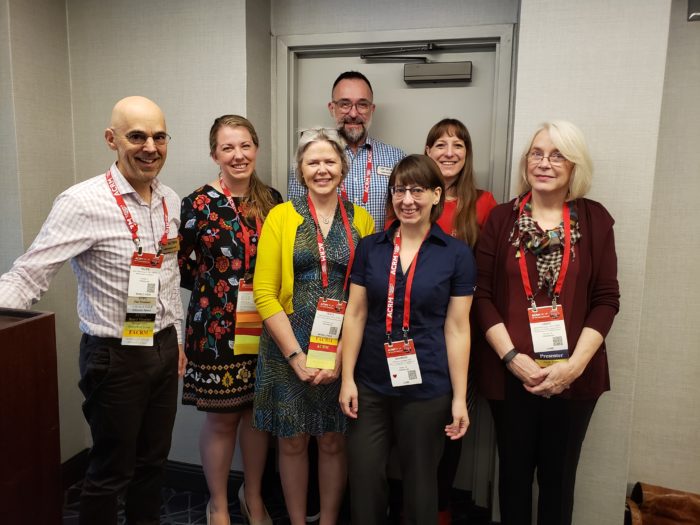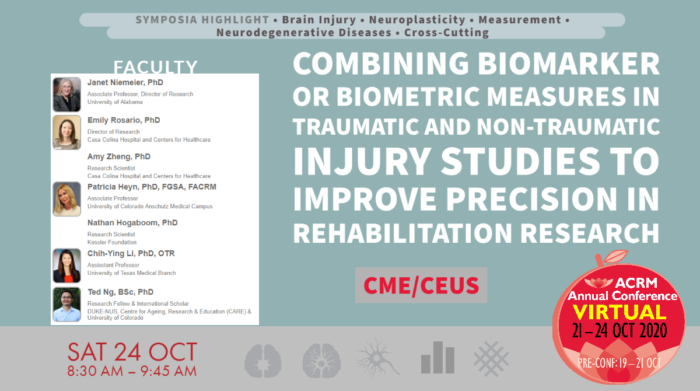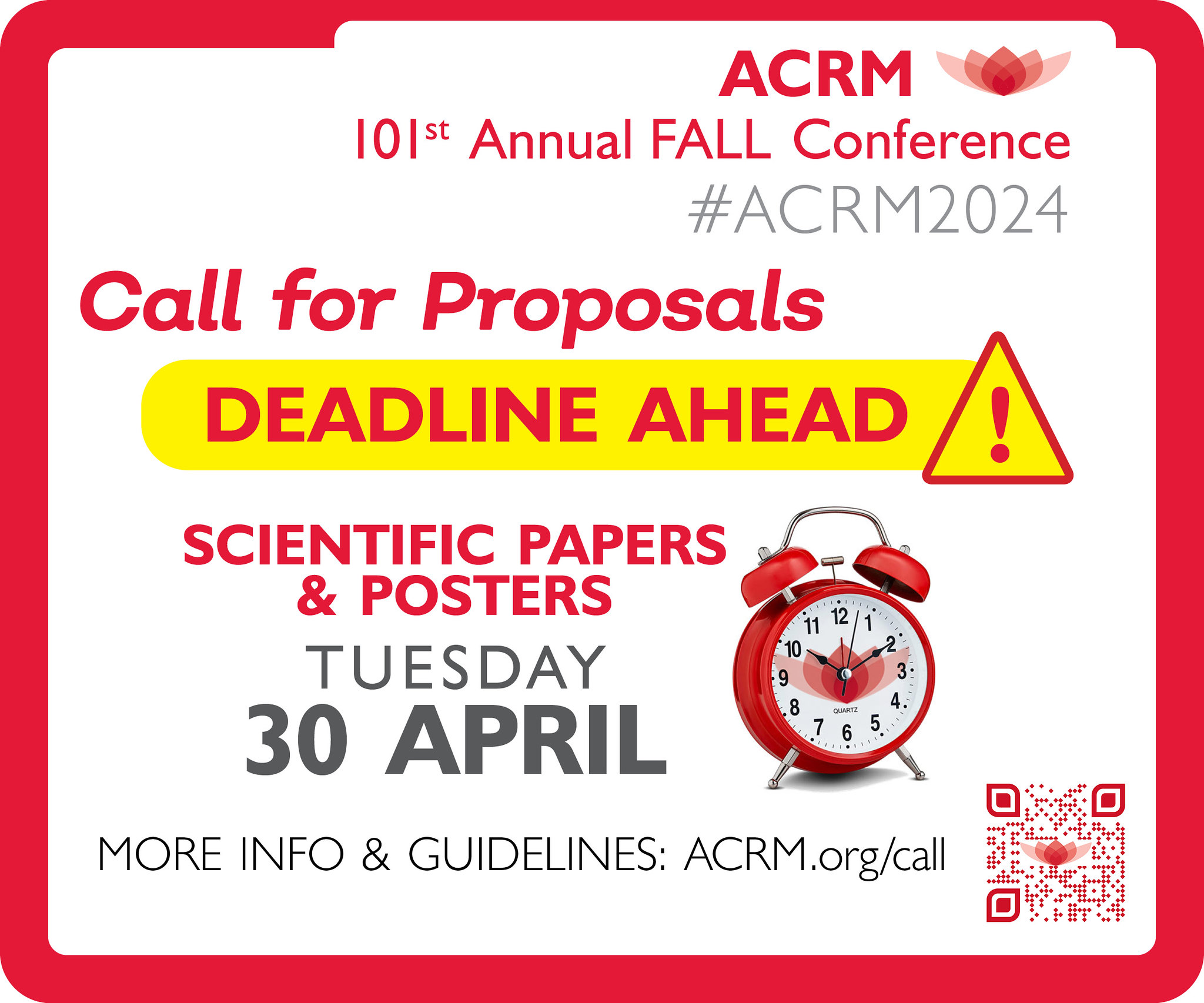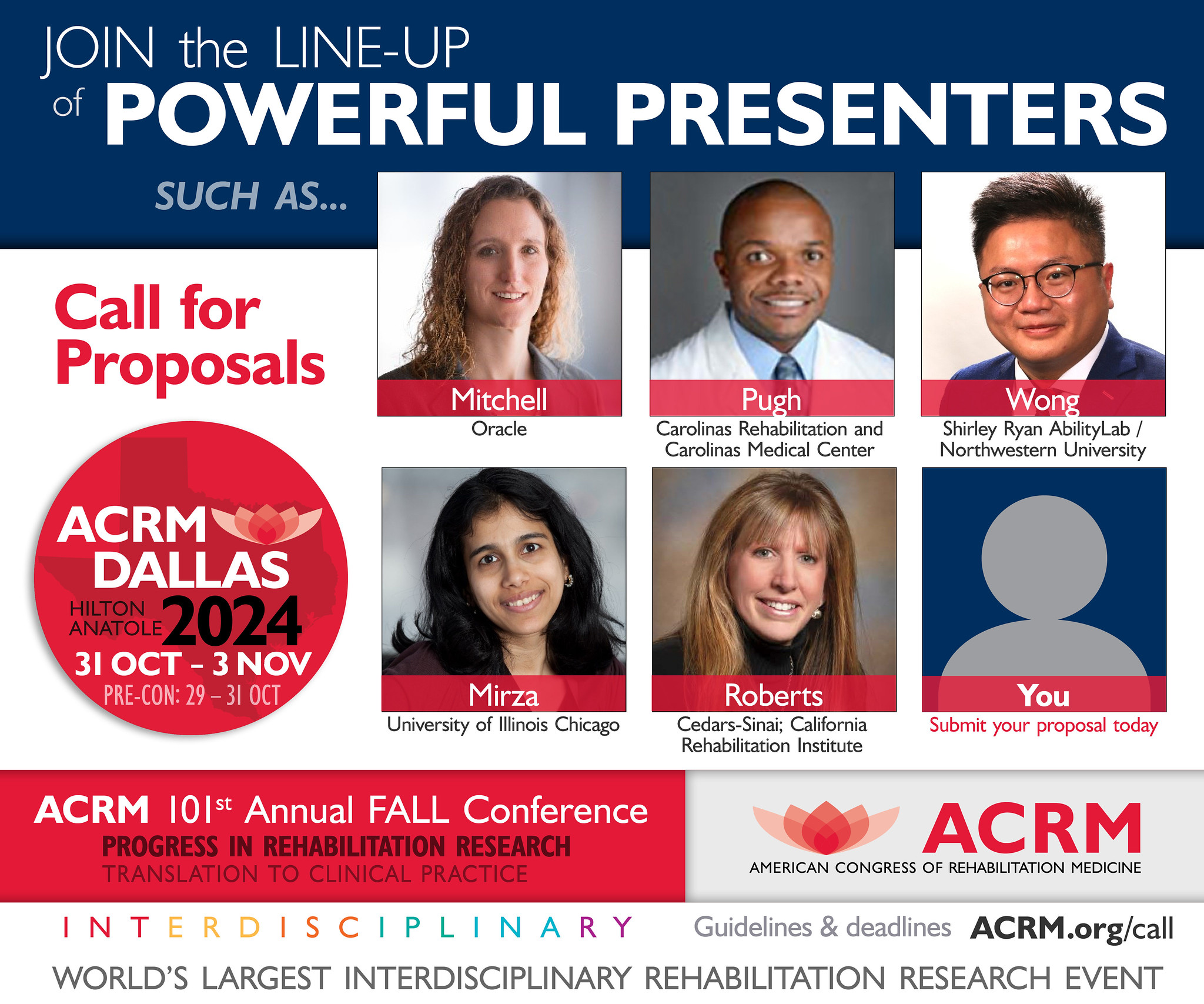Our task forces have been busy during 2020 and many of them have and will continue to generate products such as conference presentations, publications, instrument summaries, and information education pages. We want our members to get involved to either lead or join a task force. If you feel that there is something needed, join one of our regularly scheduled calls. Pictured below you will see some of our task force leaders (left to right): Allen Heinemann, Jennifer Weaver, Trudy Mallinson, Allan Kozlowski, Shannon Juengst, Ann Van de Winckel, and Janet Niemeier.

Applied Cognition & TBI

Marianne Mortera, Co-Chair

Patricia Heyn, Co-Chair
The Applied Cognition TBI Task Force is continuing its mission to address cognitive rehabilitation research needs related to cognitive outcomes, tools, and measurements. Our research is focused on a TBI pharmacological measurement and outcomes evidence synthesis and review project. The task force has been in operation since 2015, where the original group was comprised of 12 active members. Currently, there are seven active members.
Our original project was an umbrella review of 62 systematic reviews (SRs) of all pharmacological interventions with all outcomes in patients with TBI. This project produced a large database of study characteristics as well as findings from a study quality assessment using the AMSTAR rating scale, from which subsequent analyses have been performed. In addition, the task force has regularly presented its work at the ACRM Annual Conferences (3 symposia presentations in 2015, 2016 and 2017), generated one poster abstract, one peer reviewed journal publication in Brain Injury, an abstract submission for the 2020 annual meeting, and most recently submitted a second manuscript in June 2020 to Brain Injury.
Our latest work will focus on updating our literature from our original database and examining SRs using the AMSTAR 2 rating scale. We are always looking for new members as they bring insight into how we can analyze the database. If you are interested in participating, please join us and contact Patricia Heyn for more details about the Task Force’s current developments and meeting dates.
Applied Cognition & Geriatrics

Pallavi Sood, Co-Chair

Hannes Devos, Co-Chair
The Applied Cognition and Geriatrics Task Force continues to make progress towards its mission to improve rehabilitation outcomes for individuals with cognitive difficulties with the goal to translate evidence into practice. The AC Geriatric Task Force was formed nearly 6 years ago by a diverse group of nationally and internationally represented rehabilitation researchers. Our task force has published a scoping review, an I/E page, and a meta-analysis (currently under review). Members of our task force have successfully disseminated our research work at various national and international conferences including presenting symposiums and posters at ACRM annually. We are currently exploring potential new projects pertaining to technology-based cognitive training and rehabilitation interventions for older adults with cognitive impairments.
We are currently welcoming new members for 2020-2021 to help us target new areas of interest for the group. If you are interested in participating, please join us and contact Hannes Devos or Pallavi Sood for more details about the task force, current developments, and meeting dates.
Biometrics and Biomarkers

Janet Niemeier, Chair
Our Task Force will be giving a virtual Symposium during ACRM Conference 2020:
Combining Biomarker or Biometric Measures in Traumatic and Non-Traumatic Injury Studies to Improve Precision in Rehabilitation Research
Presenters: Jan Niemeier, PhD, ABPP (RP); Emily Rosario, PhD; Caroline Schnakers, PhD; Amy Zheng, PhD; Patricia Heyn, PhD; Nathan Hogaboom, PhD; Chih-Ying Li, PhD; Ted Ng, PhD
Date & Time: SAT 24 OCT // 8:30 – 9:45 AM ET
Learn More >>
In addition, we are presently working on a scoping review of composite biomarker studies using Covidence and will be working on a paper as that review concludes.
We are pleased to be growing our membership by at least three members from the former Neuroplasticity Networking Group. We plan a meeting with these and other members from that group in mid-September to get to know each other and explore mutual and possibly synergistic research interests.
Curriculum

Shannon Juengst, Co-Chair

Lauren Terhorst, Co-Chair
The Curriculum Task Force has been busy the past year. We previously developed a framework for recommended measurement components in rehabilitation science program curricula, both for clinical training programs and research (PhD) programs. We developed and sent out a survey to assess the current state of measurement education in rehabilitation science programs. We collected information on courses taught in rehabilitation science programs from University websites and identified specific people within each program who teach measurement related content to answer our survey. The courses were categorized based on the nature and level of measurement content included.
We are happy to report that we have completed all phases of this project and submitted a manuscript for publication, which is currently under review. Once published, we will be merging our task for with the Rehabilitation Measures Database Task Force, to continue the cooperative work that we have already begun with them. MNG Members interested in Curriculum can still reach out to Lauren or Shannon to be connected with relevant projects.
Long-Term Community Measurement

Shannon Juengst, Co-Chair
We continue to focus on our ongoing multi-group collaborative project, which includes Task Force members from the MNG, Technology Networking Group, BI-ISIG, and Stroke ISIG. For this project, we conducted a literature review on the use of mobile health technology for assessment of patient-reported outcome measures in individuals with acquired brain injury. We have made substantial progress on this project in the past year and hope to have a manuscript submitted by the end of the calendar year.
We are actively looking for increased membership to help us with developing new projects.
Rasch Analysis Guideline Development

Ann Van de Winckel, Co-Chair

Trudy Mallinson, Co-Chair
What began as a small group effort to help standardize the reporting of Rasch results has grown into a truly remarkable collaboration that has produced a comprehensive set of reporting recommendations. In July, the task force successfully registered these recommendations as the Rasch Reporting Guidelines in Rehabilitation Research (RULER) with the EQUATOR Network. “The EQUATOR (Enhancing the QUAlity and Transparency Of health Research) Network is an international initiative that seeks to improve the reliability and value of published health research literature by promoting transparent and accurate reporting and wider use of robust reporting guidelines.” The initial guidelines were presented as a symposium at the ACRM Annual Conference and the IOMC Pre-Conference in 2019. The feedback ascertained at both meetings have been incorporated into the RULER Guideline. The RULER Guideline consists of a RULER Statement, two elaboration and explanation manuscripts and supplementary online only terminology and reporting table. For more details about the RULER statement, guiding framework, checklist, and timeline for next steps please check out the details here.
The task force welcomes all feedback and comments on these drafts. In the coming months, the RULER Guideline will be sent to Rasch experts for review. Their comments, along with those received through the task force web page will be incorporated into the final document that will be submitted to the Archives of Physical Medicine and Rehabilitation for review later in the year. The hope is that Archives will adopt these reporting recommendations for Rasch-based manuscript.
Rehab Measures Database

Allen Heinemann, Chair
The Rehabilitation Measures Database (RMD) Task Force formed in 2016 to develop and enhance the content of the RMD, an online summary of instruments used by rehabilitation nurses, therapists and physicians, to help them select standard assessments to monitor patient progress. The RMD collaborates with various institutions to enhance measurement and assessment content through contribution of instrument summaries to the RMD online database. The RMD Task Force assisted in developing an Author Toolkit for instrument summaries, published instrument summary “tear sheets” in Archives of Physical Medicine and Rehabilitation, conducted a “crosswalk” project to integrate NINDS’ Common Data Elements, and has increased its LinkedIn members (100+!). In 2021, we want to engage new members so more employment-related instrument summaries are created and incorporate the CDE crosswalk into RMD for greater clinical utility.
Please reach out to the Chair if you are interested in joining the Task Force and/or contributing an instrument summary to RMD!
Standards

Allan Kozlowski, Chair
The Terminology Task Force (TTF) of the ACRM Measurement Networking Group (MNG) has reconstituted after hiatus. A framework has been established to review the concept of validity and terminology. Our wish for 2020 is that we submit a manuscript for peer review. We anticipate an influx of new members once the Rasch Reporting Guidelines Task Force completes their manuscript.
If you are interested in the Terminology Task Force, contact Al Kozlowski.










